Key takeaways
- Rousseau’s social contract emphasizes collective agreement as the source of true freedom, shifting the focus from mere obedience to active participation in societal governance.
- The principle of “general will” aims for the common good, encouraging a balance between individual rights and social responsibility, while sovereignty lies with the people through ongoing consent.
- In philosophy education, engaging students with Rousseau’s ideas fosters debate about democracy and civic engagement, transforming abstract concepts into relatable experiences.
- Participating in a collective agreement requires acknowledging that freedom is enhanced through mutual cooperation and shared responsibilities, not just individual liberties.
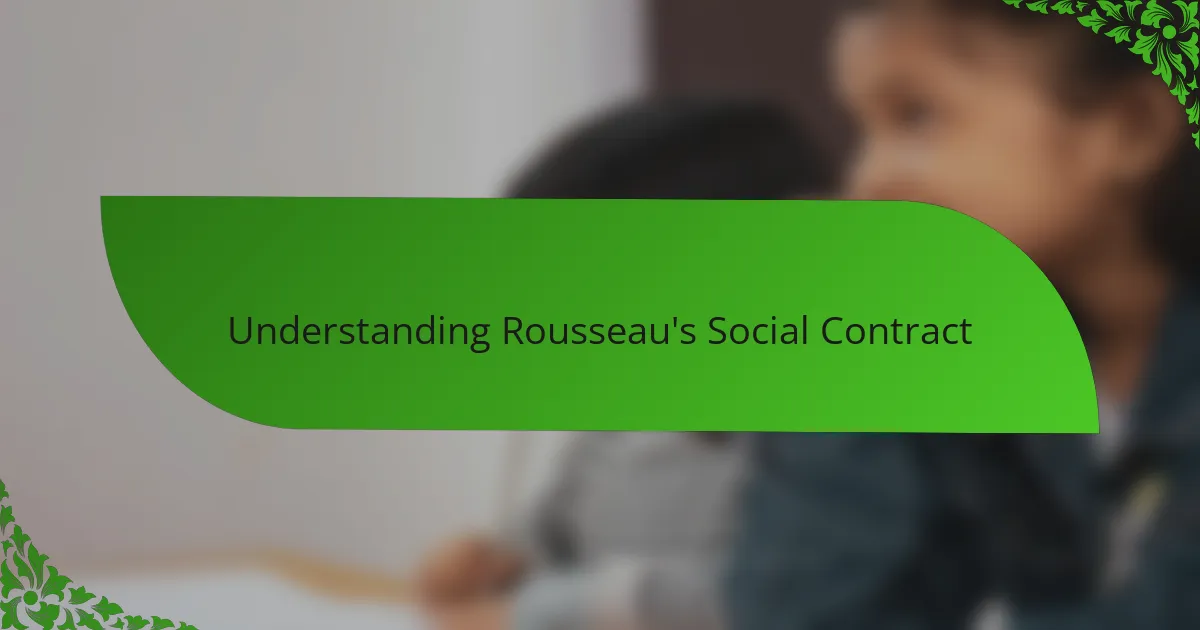
Understanding Rousseau’s Social Contract
When I first encountered Rousseau’s idea of the social contract, I was struck by how deeply it challenged the common views of authority and freedom. Have you ever wondered what it truly means to be free within a society? Rousseau suggests that real freedom comes from willingly agreeing to rules we set together, not from simply obeying an external power.
Reflecting on this, I realized that his social contract is less about surrendering rights and more about finding unity through collective agreement. It’s like joining a team where every member’s voice shapes the game plan—something I found quite empowering, especially when considering how modern societies function.
At times, I felt a mix of skepticism and hope while engaging with Rousseau’s text. Could such an ideal contract work in reality, or is it just a philosophical dream? This tension, I believe, is where the true value lies—prompting us to continuously question and strive for a society where freedom and cooperation coexist.
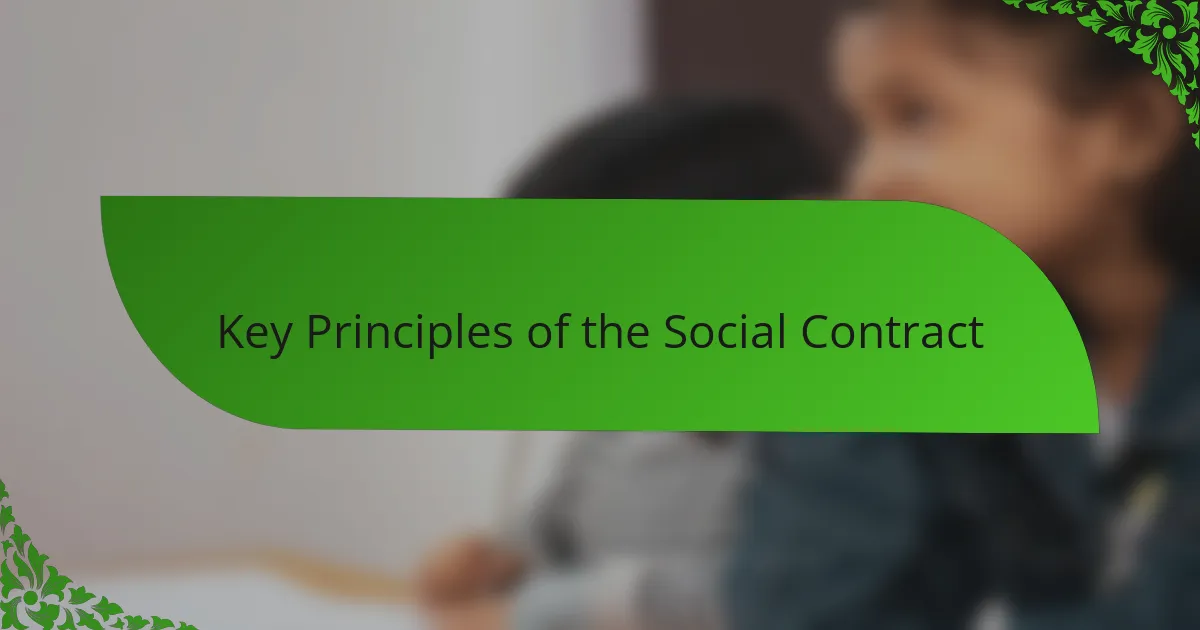
Key Principles of the Social Contract
One principle that really caught my attention was Rousseau’s idea of the “general will.” It’s not just majority rule, but a collective intention aiming for the common good. I remember wondering: can this collective desire truly represent everyone’s interests, or does it risk suppressing individual voices? That question lingered with me as I thought about how we balance personal freedom and social responsibility.
Another key aspect is the idea of mutual obligation. According to Rousseau, when we enter the social contract, we aren’t losing our freedom but rather exchanging natural liberty for civil liberty—freedom protected by laws we all agree to. This idea reshaped how I view citizenship; it’s not a burden but a commitment to a shared life where each person’s rights depend on others honoring their part.
What fascinated me most is the principle that sovereignty lies with the people, not a ruler. Rousseau insists that legitimate power emerges only from the collective agreement of citizens, making governance an act of continual consent. Reflecting on this, I realized how radical this was for his time—and how it still challenges us today: How often do we truly participate in shaping our laws, rather than merely following them?
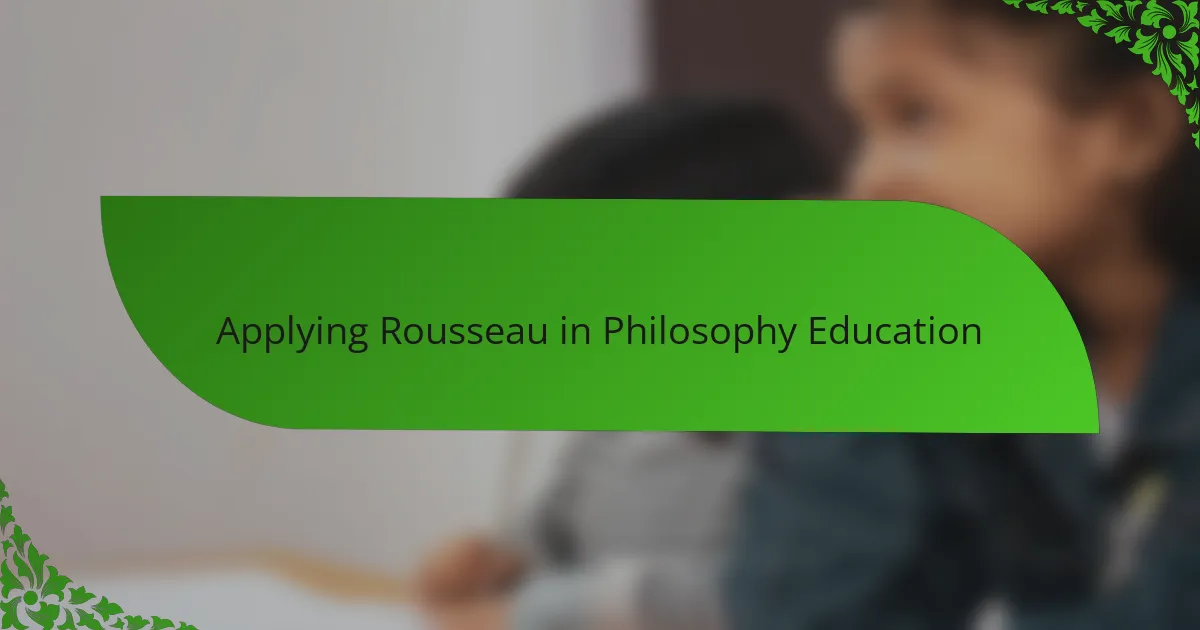
Applying Rousseau in Philosophy Education
Applying Rousseau’s social contract in philosophy education has been a rewarding challenge for me. I’ve noticed that inviting students to debate the concept of the “general will” sparks lively discussions about democracy and individual rights. It’s fascinating to see how this idea pushes them to reconsider what it means to participate actively in society, rather than being passive observers.
Sometimes, I find myself asking students: What would it feel like to truly live in a community where everyone’s voice shapes the laws we follow? Their varied responses reveal both hope and doubts, mirroring my own initial reactions to Rousseau’s text. These moments create a dynamic classroom atmosphere where theory meets real-world concerns.
Incorporating Rousseau also means encouraging students to reflect on the delicate balance between freedom and authority. I often share my experience wrestling with the notion of exchanging natural liberty for civil liberty, which helped them grasp citizenship as an intentional commitment, not just a status. This shift in perspective, I believe, is a crucial step toward deeper philosophical understanding and active civic engagement.
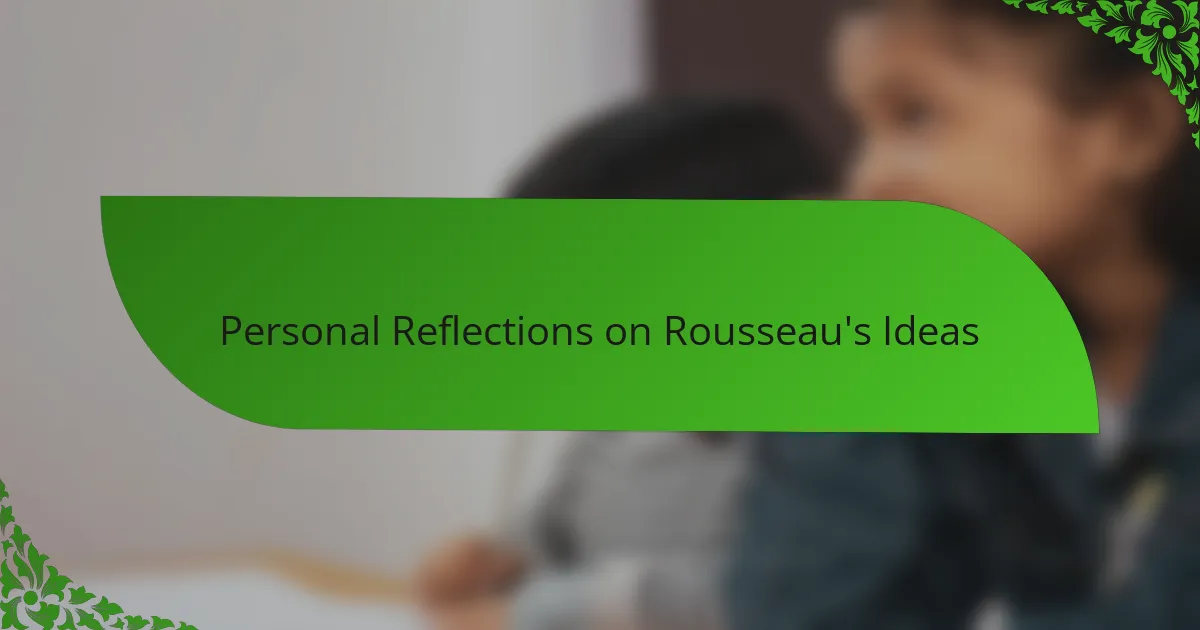
Personal Reflections on Rousseau’s Ideas
Engaging with Rousseau’s ideas personally, I found myself wrestling with the tension between idealism and reality. Can a society truly embody the “general will” without silencing dissent? This question often left me both hopeful and cautious, pushing me to consider the practical limits of collective agreement.
I also noticed how Rousseau’s concept nudged me to reevaluate my own sense of freedom. Was I genuinely free, or was I just conforming to unspoken social rules? Reflecting on this helped me appreciate the kind of freedom that comes from active participation rather than passive acceptance.
At times, these reflections felt deeply personal, almost like a conversation with myself about my role in society. I realized that embracing Rousseau’s contract isn’t just philosophical—it’s an ongoing commitment to listen, engage, and sometimes challenge the status quo. Have you ever felt that same push to rethink your place within a community? For me, this was a transformative realization.
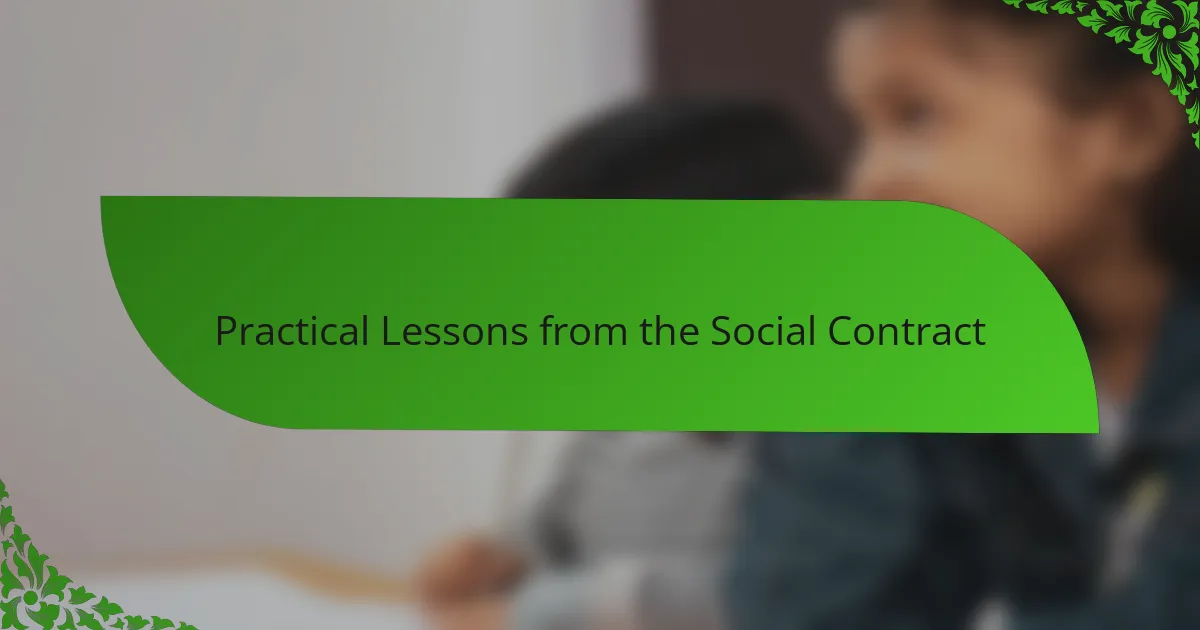
Practical Lessons from the Social Contract
Rousseau’s social contract taught me that cooperation isn’t just nice—it’s essential. When I started thinking of laws as agreements I help create, I felt a shift from feeling controlled to feeling involved. Have you noticed how much smoother things seem when everyone actually agrees on the rules? That’s the power of collective commitment in action.
Another lesson that stayed with me is the idea that freedom thrives within limits we choose together. At first, it felt counterintuitive—how can giving up some “natural” freedoms make me freer? But then I realized it’s about security and mutual trust, which allow us to live fully without constant fear or conflict. I’ve seen this play out in group projects or communities where clear, shared expectations prevent chaos and promote fairness.
Finally, Rousseau’s emphasis on the “general will” reminded me that true freedom requires ongoing participation, not just passive acceptance. It’s easy to feel detached from politics or community decisions, but engaging—even in small ways—builds a sense of ownership and responsibility. Have you ever experienced a moment when speaking up or joining a decision made you feel more connected? That’s the social contract at work, making freedom a living, breathing experience.
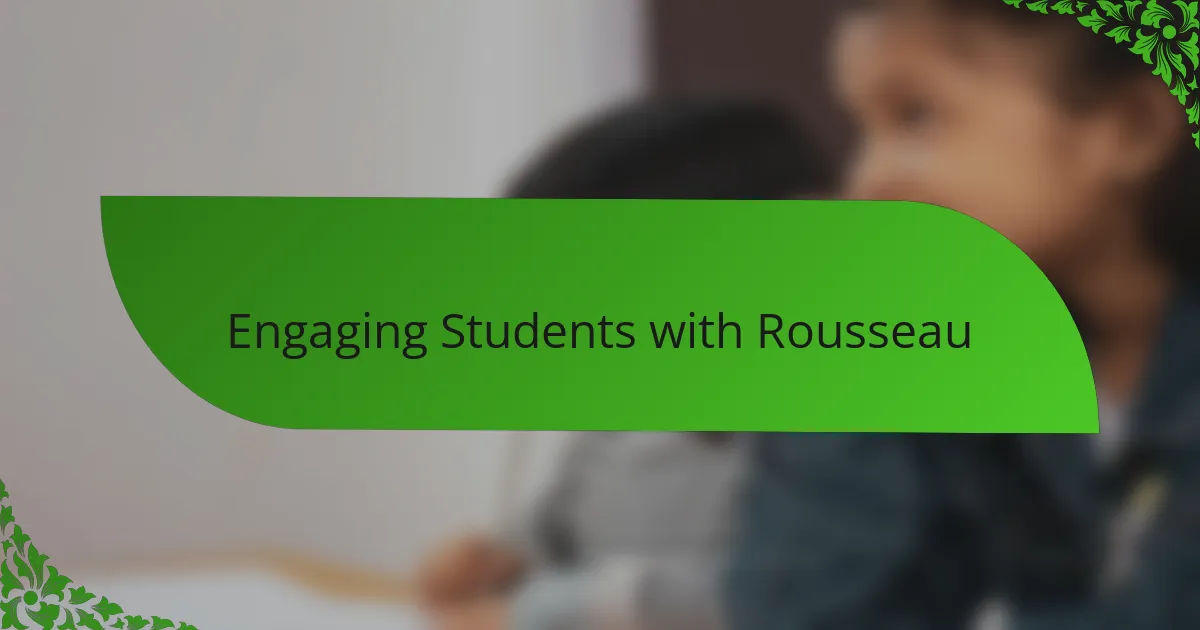
Engaging Students with Rousseau
Engaging students with Rousseau’s social contract often feels like opening a door to a room full of questions rather than answers. I’ve noticed that when I ask them to imagine what it’s like to give up some freedoms to gain others, their curiosity sparks in unexpected ways. It reminds me of the first time I grappled with this paradox—how losing some liberty can mean gaining true freedom—it was puzzling, yet deeply eye-opening.
What excites me most is watching students wrestle with the idea of the “general will.” They challenge its feasibility and fairness, sometimes passionately defending individual rights while also recognizing the need for common good. This tension creates a lively classroom environment where theory transforms into a lived debate, echoing Rousseau’s own struggles with society’s complexity.
Sometimes, simply encouraging students to reflect on their own experiences with rules and community cooperation breaks down abstract concepts into relatable moments. For example, discussing how group projects require mutual agreements brings Rousseau’s philosophy off the page and into everyday life. These connections often light a spark that makes philosophical ideas feel relevant and personal.
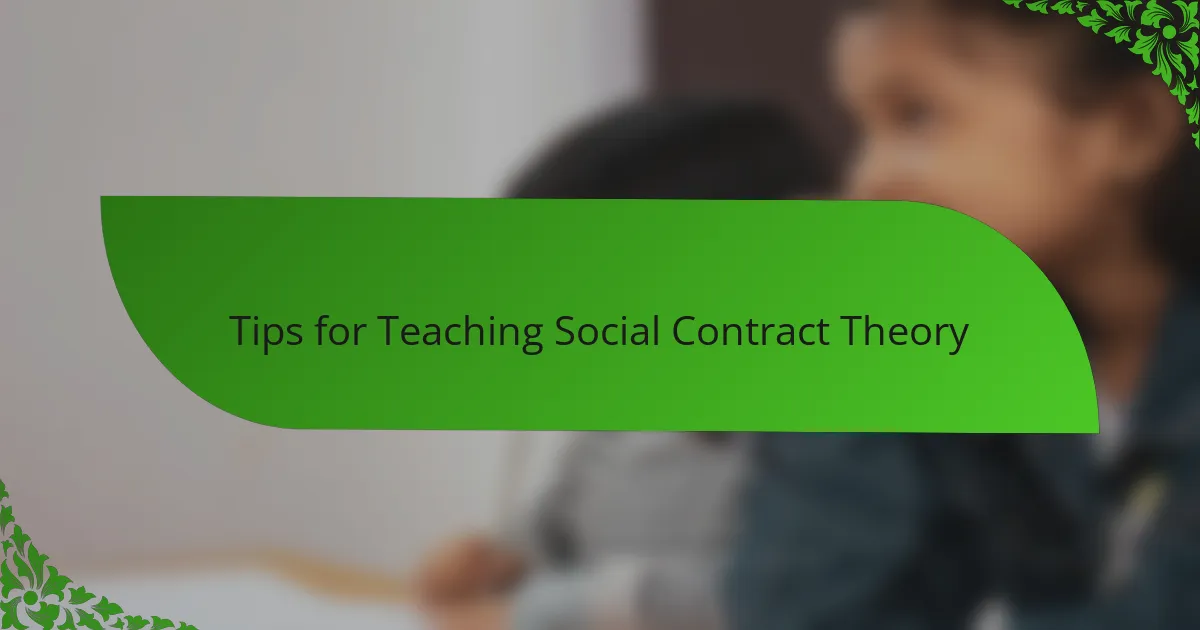
Tips for Teaching Social Contract Theory
When teaching social contract theory, I’ve found it invaluable to encourage students to see themselves not just as learners but as participants in a collective agreement. Asking questions like, “What freedoms are you willing to exchange for the benefits of society?” really pushes them to reflect deeply. This personal connection often transforms abstract ideas into tangible, relatable issues—they begin to grasp why Rousseau’s contract isn’t just theoretical but lived.
I also suggest incorporating real-life examples that mirror social contract dynamics, such as classroom rules or community projects. Sharing how I once facilitated a debate on fairness in group work brought Rousseau’s notion of the general will to life—it became less about power and more about mutual respect and shared responsibility. These moments help students feel the weight and challenge of balancing individual rights with the common good.
Another tip is to create space for skepticism and doubt. I remember wrestling with questions about whether true collective agreement is achievable or if it suppresses dissent. Inviting students to voice similar concerns makes the dialogue richer and more honest. Isn’t philosophy at its best when it doesn’t give easy answers but encourages us to grapple with uncomfortable tensions? This approach not only deepens understanding but fosters a critical mindset that’s essential in philosophy education.